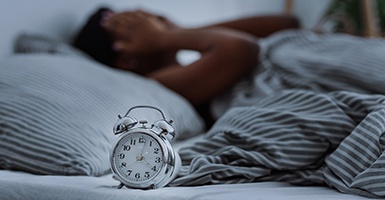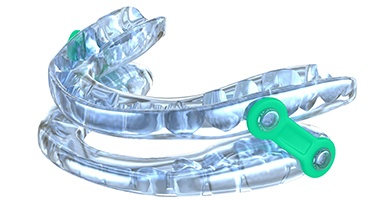Sleep Apnea Treatment – Odessa, TX
Stop Snoring and Sleep Better

Everyone needs to be able to get plenty of sleep to stay healthy and feel their best. Most adults require about 7 to 9 hours of sleep per night. But if you have sleep apnea, it can be extremely difficult to get enough rest due to pauses in your breathing constantly interrupting your slumber. Many dentists like Dr. Cobb can help patients get their sleep apnea under control. Please give us a call if you need help overcoming a sleep disorder.
Why Choose Steve W. Cobb, DDS for Sleep Apnea Treatment?
- Expertly Personalized Oral Appliances
- Dentist Who Has Thoroughly Studied Sleep Dental Medicine
- Conveniently Located Practice
Sleep Better West Texas
Steve W. Cobb, DDS
4210 Maple Av Odessa, Tx 79762
Tel: 432-316-2026Fax: 432-316-2027
info.sbwt@gmail.com
What is Sleep Apnea?

Sleep apnea is a disorder that affects your breathing while you sleep. At multiple points during the night, your body may temporarily stop breathing. This can occasionally be due to the brain not sending the right signals to make sure breathing continues; more often than not, though, the problem is that the airway has been blocked by relaxed tissues in your mouth or throat.
When your breathing stops, you’ll wake up for air. However, most people don’t remember these awakenings because each one is very short. As a result, many people who are currently suffering from sleep apnea don’t even realize it.
There are a few symptoms that can indicate the presence of sleep apnea. Some of these warning signs include:
- Gasping for air during the night.
- Snoring very loudly.
- Waking up with a headache.
- Having trouble remembering things.
- Generally being moody or irritable.
- Chronic tiredness.
The Dangers of Sleep Apnea

When you have sleep apnea, it’s nearly impossible to get enough rest during the night. As a result, you may be drowsy during the day, which could lead to accidents when driving or operating any kind of heavy machinery. Your mental well-being could suffer in other ways as well; people with sleep apnea often show symptoms of depression.
Of course, the toll that a lack of quality sleep takes on your body shouldn’t be underestimated. The longer you go without treating your sleep disorder, the more likely you’ll be to suffer from life-threatening cardiovascular events like heart attacks. In short, ignoring sleep apnea can be very dangerous, and it’s in your best interest to have it treated promptly.
Sleep Apnea Treatment Options

You’ll need to complete a sleep study in order to determine whether your symptoms are indeed due to sleep apnea. You can only start seeking treatment once you know what kind of sleep disorder you’re suffering from.
For many people with sleep apnea, an oral appliance can make a big difference. Each oral appliance is made to slightly adjust the position of the jaw. This simple step can be all it takes to significantly lower the chances of your airway being blocked, meaning you’ll be less likely to experience sleep apnea episodes. Reach out to us today to learn more about how we use oral appliances to help our patients get their sleep disorders under control.
Sleep Apnea FAQs

Many people are uncertain about how to handle sleep apnea due to being unfamiliar with the disorder and the way it’s treated. If you’re interested in learning more about sleep apnea, take the time to review the FAQs below; they include a number of topics that our patients often wonder about. Of course, there are plenty of other questions that might be on your mind, and we can provide the answers you’re looking for if you reach out to our team.
Can I Diagnose Sleep Apnea on My Own?
While there are several symptoms associated with sleep apnea, they generally aren’t enough by themselves to say for sure that you have the disorder. The only way to make a reliable diagnosis is to have a sleep test performed by an expert. As such, you should get in touch with a professional right away if you notice any warning signs of sleep apnea, such as constant tiredness. A diagnosis is necessary before you begin any type of treatment.
Will My Sleep Apnea Go Away If I Lose Weight?
It might, depending on what the cause of the sleep disorder is. Being overweight often means there’s more tissue around the airways that could potentially cause obstructions. You’ll therefore have a greater chance of your breathing being interrupted during the night. Losing weight can help you get rid of excess tissue, thus reducing a major risk factor for sleep apnea.
That being said, it’s possible that you might still experience sleep apnea symptoms even after weight loss. As such, it’s a good idea to pursue other treatment options as well. Also, you may want to have another sleep test performed once you’re done losing weight to see if sleep apnea is still present.
How Should I Clean My Sleep Apnea Oral Appliance?
Like virtually everything else in your mouth, your oral appliance is a potential target for bacterial buildup. Failing to clean your oral appliance regularly could lead to cavities, gum disease, and other unpleasant dental issues. Take proper care of your oral appliance by:
- Brushing it with a soft-bristled toothbrush every morning when you take it out of your mouth.
- Rinsing it and drying it off before storing it safely in its container.
- Periodically using denture cleanser to kill any bacteria that you may have missed while brushing your appliance.
Can I Have Oral Appliance Therapy If I Grind My Teeth?
If you have bruxism, you might be worried about damaging an oral appliance. However, there’s no cause for concern; our oral appliances are made out of strong materials that can withstand repeated clenching and grinding. As a matter of fact, the treatment can be especially beneficial for patients who have bruxism as well as sleep apnea. The oral appliance will keep your upper teeth separated from your lower ones, which helps prevent the damage to the enamel that bruxism usually causes.


 (432) 367-4774
(432) 367-4774